How I Write
22 Oct 2014
Twenty-five of the agency’s authors outline their writing habits.
Nicholas Best
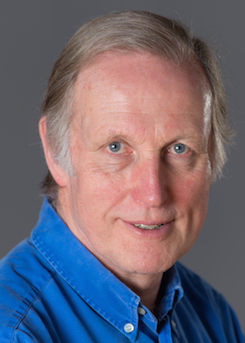
I live in a Cambridge village and work in a 17th century barn across the drive from the house. There’s a 400-year-old skeleton under the floorboards, a cat buried in a corner to ward off evil spirits. It doesn’t work for the Inland Revenue.I start writing after breakfast and continue until lunchtime. If I’m lucky, I’ll have written 400 words by then, although I do occasionally stretch to a thousand. If I’m unlucky, I’ll have clocked up minus 200 or so after deciding that whatever I wrote yesterday was rubbish. Apart from the odd Spitfire overhead in summer, there’s no noise to disturb me. I write the first draft with pen and paper, then produce a second draft on computer. I write the third draft with pen and paper again and so on for anything up to five or six drafts. After lunch, I have a nap before going back to work for another hour and a half. I sometimes write again in the afternoon. Usually I just sit at my desk thinking and planning, or else staring into space and having unsuitable fantasies. When all is done, I lock up the barn, stroll down to the river and talk to the horses in the field, unwinding after a hard day at the coal face. All too often, I then unlock the barn again and go back to work for another hour, having had second thoughts about whatever I was writing that day. It’s usually then that I decide to tear the whole lot up and begin again from scratch next morning.
Jonathan Conlin

I’m writing a book.” The very phrase seems self-indulgent and strange, more so at a time when we count the words and minutes, even the characters and the seconds. In popular myth, the writer is a mercurial figure, and when I started writing I assumed that the process would consist of long periods of staring at a flashing cursor interrupted by flashes of inspiration which would keep me at the keyboard for 50,000 words. Having heard about all those writers’ retreats for novelists, I also assumed that it would help to have a beautiful view to look at. All wrong. In any case, historians don’t get retreats, though we do get a muse, Clio. Writing needs routine. I carve out blocks of at least three to five days. The best writing happens between nine and noon, after plenty of sleep. In the days before starting I often find myself writing in my head, and I am as sure as I can be that similar preparatory work occurs while I am unconscious. My daily target is 2,500 words. I always try to stop in mid flow, knowing what I should start with the following day. But I don’t have the discipline. I run on well past my daily target, only to spend most of the next morning staring at the cursor flashing. Surroundings don’t matter, although I often seem to write in a room (or, at the moment, a shed) which is so cold I wear a ski jacket and wrap a rug round my legs. Cold concentrates the mind. The rug does at least match part of the Bohemian stereotype. So, too, does the anxiety that tomorrow the works will seize up. A bad day implies this has already happened. A good day is dumb luck. Although a routine creates an opportunity, the stereotype is spot-on in this respect, too. Good writing happens to you, rather than being something you are doing. You derive pleasure rather than pride from it. One might have thought that, having written several books, I would by now have built up some sort of relationship with Clio, a credit line I could draw on when I ran short. But she doesn’t work like that. As a writer, I’m only as good as what I wrote yesterday.
David Day
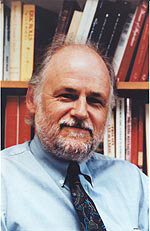
I wish I could say that I get up before dawn to begin writing, but that has never been my habit. There’s so much to be done, with breakfast, checking emails and news websites and Facebook. Just in case something has happened while I was sleeping. It rarely has. But you need to be sure. Even then, it’s still not time to charge up the laptop, in the confident expectation that words will come. To encourage them along, a leisurely visit to the local café is usually called for, to sit in the window and sip on the caffeine and soak up the sun. Only then, will I be ready to embark on the next stage of the journey, looking out occasionally from my first floor study at the honeyeater nesting in the tree outside my window or watching the odd jogger lope past. Despite the distractions, words appear on the screen in sufficiently quick succession for several hundred to be done before lunch and many more after lunch, which could call for another coffee in a different café. Just to celebrate, and to think about the many more that will need to be written. If there is a deadline pressing, more might be written after dinner. Throughout it all, music provides a fairly constant companion. Everything from Bob Dylan to Verdi, and many styles in between, although I sometimes get so absorbed in the writing that I’m unaware a CD has finished. Which presumably means that the music has served its purpose.
Jane Dismore
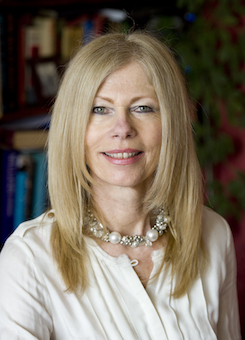
I am truly the writer in the attic, as that is where my study has been created. I can also honestly say that I stare at a brick wall all day: my desk sits in front of a prettily-shaped chimney breast, on which I have stuck some interesting postcards and Marie Curie daffodils in the gaps. The walls are covered with posters from plays and art exhibitions I’ve attended. My favourites are of David Hockney’s exhibition at the Royal Academy 2012, and All My Sons starring David Suchet and Zoe Wannamaker. There is a window, too, so I’m not bereft of natural light, and sometimes I treat myself by peering out at the tree tops and little reservoir beyond. But I’m not easily distracted. That’s the trouble: I could often sit there quite happily for 24 hours a day but have to remember to eat and exercise, not to mention speaking to members of the family.
I’m not an early morning person and prefer to do practical tasks then, starting work at about 11am. How much I write per day depends on what I’m doing. I’ve been writing full-time only for the last 15 months, and recently had a book published, so at the moment I’m still spending time on publicity and research for related articles. In the months leading up to publication, writing and editing was taking up all of my day and most evenings. Soon I must start thinking of the next book and perhaps a regular routine will emerge.
Piu Marie Eatwell
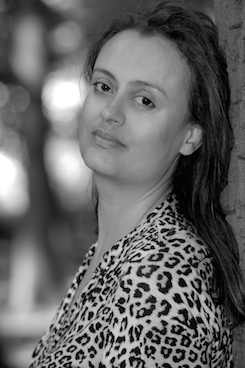
Writing is, by definition, a lonely occupation. Which generally doesn’t bother me too much, in fact suits me just fine. Throughout my life, I have had a horror of office life and the politics and bitching that generally go with it, from the daily anxiety of who to have lunch with to making sure one doesn’t inadvertently drink from someone else’s coffee cup. On the other hand, the total isolation of the Roald Dahl shed approach doesn’t work for me either, for in order to stimulate me into action I need the buzz of people around me. Like D.H. Lawrence, I like people quite well….‘but at a little distance.’ The solution to this dilemma – for me – has been to work in public places. In fact, I am the self-styled queen of Parisian Internet cafés. There’s a great one round the corner from my Paris apartment, and if that’s too busy, the Starbucks in Opéra is my temple of inspiration. In this way, I can be immersed in my thoughts, but still connected to the humdrum reality of daily life. With three young children to chase after, writing for me tends to fit around their schedules: I aim to complete a large chunk during the day when the kids are at school, then another sizeable chunk at home after bedtime. I am someone who needs a deadline to snap into action. Without a definite commission, I tend to languish in the dangerous and distracting corridors of social media (or - even worse – the temptations of the contents of the kitchen fridge). Once I have a commission and deadline, however, I snap into action like a fury. My usual method is to split the 80,000 words required of the average non-fiction work into say twenty chapters, setting myself a deadline of so many chapters a month, leaving the final month before the delivery deadline for last-minute changes. So far, I’ve never missed a deadline, and in fact I usually deliver my manuscript early. Oh, and I never forget the celebratory ritual that follows completion of the last page: a glass of Provençal rosé with ice cubes, accompanied by steak tartare in the local bistrot!
Peter Forbes
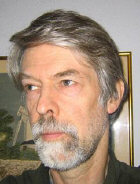
Like most writers I have my neuroses and quirky hang-ups about actually doing it. In theory I like to get away from the computer and start drafting in longhand but my handwriting is so poor I have to type it within hours before it become unreadable. If I go straight to computer, my typing is even worse and I have a tic of racing it through the spelling checker blindly to turn it into a semblance of real text. It then contains numerous grotesque word substitutions. I don’t start to feel happy until I’ve eliminated this muddle and formatted it in 12 point Times Roman double spaced. However rough, this is a text I can then print and take away to do the real work of knocking it into shape. I then draft and redraft until I can find no more errors or room for stylistic improvement. If I’m lucky, at some point, an organizing force-field takes over and I can see exactly how it all needs to fit for maximum impact. If it is book text, it will then lie fallow for a bit. Re-reading weeks or months later usually shows room for improvement that was unnoticed in the heat of the moment. I don’t have a routine for writing because it has to take its place in a daily to-do schedule involving teaching preparation, research and all the usual chores. I envy the 1000-words-before-lunch writers but I will never be one of them.
Cathy Glass

I rely on a writing routine; it’s the catalyst that triggers my writing, like the dinner bell rung for Pavlov’s dogs it sets my creative juices flowing. I’ve had the same writing routine for the last fifteen years: I rise early (approximately the same time every morning), put on my joggers and a comfortable top and creep downstairs so that I don’t disturb my family. I make a large mug of coffee and go through to the front room where I collect my paper, pen, and the printed text I’ve written the day before. I go into the living room and quietly close the door. I need absolute quiet for writing and I need to be alone. I sit in the same chair each morning and with my coffee within reach I begin by reading what I’ve written the day before, editing with a pen as necessary. By the time I come to the end of the previous day’s work, my new words are ready to flow. I still use pen and paper for the first draft, as I do for editing. I write very quickly, often unaware of my surroundings as my pen dashes across the page until the words stop. I don’t force any more. As the author Ray Bradbury said: ‘My stories run up and bite me on the leg – I respond by writing down everything that goes on during the bite. When I finish, the idea lets go and runs off.’ I know exactly what he means. When ‘the idea has run away’ and I’ve run out of words I go through to my study and switch on my computer. First, I input the edits from the previous day’s work, and then I type up the new work. I print out the new pages ready for revising the following morning, and place the edited pages in the growing pile that will be my new book. It takes me six months to write and revise a full length book of approximately 85,000, and I never let anyone see it unto it is finished and I know have achieved my personal best.
Catherine Hewitt
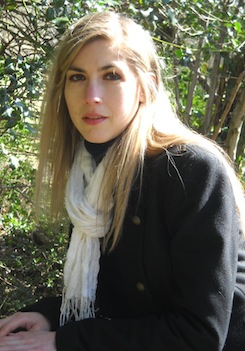
Until recently, my writing time has been largely dictated by my work as a private French tutor and adult education lecturer. Typically, I would go out to teach a morning class, and I could teach up to 3 classes in the evening, usually starting at about 4.00. This has made the hours between 11.00 and 3.00 incredibly precious. I try to keep class planning to a minimum these days in order to maximise the writing time. All my writing in the last few years has been produced from the cramped confines of the small bedroom I inhabit at my parents’ house. It was therefore cause for great celebration when last month, I moved my desk, computer and other tools of my ‘trade’ outside to a revamped garden shed, generously patched up by my father, and equally generously referred to as ‘the summerhouse’. Now, I can sit at my desk (in one of the few possessions I would dive into a burning building to save, my ergonomic computer chair, complete with coccyx cutout) and gaze hopefully at the sheep snuffling about in the field at the end of the garden whenever inspiration is lacking. Years of working in my bedroom means that I still pinch myself every morning when I unlock the door to my very own Dahl-esque writing space, however chilly and poorly lit it may be at present!
Completion of my new workspace has happily coincided with my decision to reduce my teaching hours this term as the submission date for my manuscript looms. This has created a temporarily blissful (if financially nail-biting) existence, whereby on certain days, I can be working on the book all day. I do not regret this ‘career move’ for a second - well, perhaps fleetingly at the Sainsbury’s checkout when the cashier eyes my trolley full of economy products with something between self-satisfaction and knowing disdain! But otherwise, I have no regrets. On such days, and when I’m not at the British Library, the morning is spent writing and amending whatever I was working on the previous day. A former university lecturer introduced me to Dragon NaturallySpeaking a few years ago, and I have never looked back. I now dictate most of my work. Its mastery of slang and expletives is improving daily, though its grasp of French is less reliable! The afternoon is spent researching (books, online newspapers etc), and I finish up with administrative tasks, sometimes e-mailing specialists or tourist offices in France, depending on the chapter I’m working on. I remember a teacher back at primary school once beholding a fellow student’s desk, which was buried under a disorganised heap of dog-eared papers and chewed pens. In disgust, said teacher thundered: ‘This is your work! If your desk is a mess, your work is a mess. ’. The terrifying possibility that this might be true still haunts me. I’m not prepared to take any chances, so at the end of each day, however tired, grumpy and in need of tea I may be, I leave my workspace tidy. Tomorrow, I can start with a clean slate. Anything could happen. That is the magic of this job.
Michael Jago
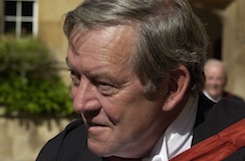
Virgil did a day’s work by noon. As a young man, I thought that impossible, but I now imitate him, ashamed of myself if I am not at my desk by 0400h. The morally superior mood launches me well; too early for music; no sounds yet to disturb me. The first three hours are productive, abundant, the time that I express opinions rather than narrative. By 0700h people are stirring; I switch gears. Less morally superior, I adapt to life around me. Now precision matters more than expansive opinion. Time for Handel, perhaps Dixit Dominus or Pergolesi Stabat Mater. In France I walk around the village with a neighbour from 0715h to 0745h; in Chicago I watch people heading to work. The next few hours are different, less sacred. Now I write the facts, the framework for the chapter. Slower going. From four to seven I maybe wrote a thousand words; now structure matters more than revelations. Now come sourcing, footnotes, exact sequence. I promise myself a cup of coffee and a cigarette at perhaps ten o’clock, absolutely not before. If I’m working on the first draft I have a week to finish its framework; if I’m further along, there’s different pressure. I must apply pressure; if not, I’ll remember that the wistaria needs clipping, the laurel pruning. At noon I debate whether Virgil was right to call a halt or if I should write just a little more. At the morrow’s dawn I realise that Virgil knew his onions.
Christian Jennings
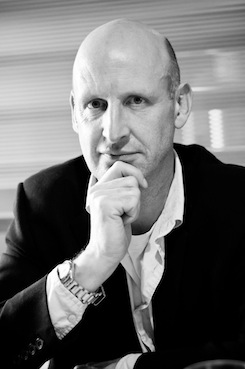
It was, I think, the Polish novelist Joseph Conrad who said that “when I’m looking out of the window, my wife doesn’t realize that I am in fact working very hard.” Having been a writer and journalist for twenty-five years, I’m on Conrad’s side. I also have a very nice view. I live in Turin in northern Italy in a fifth-floor attic apartment, and the sun comes in from a window to the left of my desk. The view outside is of three churches sitting on the hills surrounding the city, and to the far west, the Alps. It’s hard not to feel spoilt. But for fifteen years as a foreign correspondent, my writing was done wherever that day’s deadline found me. In a Zairean hotel room with no electricity or running water, on a malarial floodplain in Sudan, in a ruined house in Somalia, and once even taking cover behind a fresh dung-heap in Macedonia, under fire. And in endless, endless hotel rooms from Rwanda to Kosovo, alternately boiling in summer or freezing in winter. So Turin is a real treat and I feel very lucky.
The current book I’m writing? A large work of historical non-fiction about the last year of World War Two in Italy. After a long, sun-spangled summer spent travelling some 3,400 miles on the Italian train system, to visit museums, archives and battlefields in twenty towns from the Mediterranean to the Adriatic, now’s the time to write. My desk is mid-height, wooden, and straight in front of me are lined up some fifteen of the best books on WWII – Winston Churchill, Chester Wilmot, Carlo D’Este, David Stafford – to provide aspirational impetus. A good chair is vital to keep your lower back from hurting – mine is a blue swivel office chair that cost twenty-nine euros, from Ikea outside Turin. I can sit in it for hours. My daily target is 1,500 decent words per day minimum, and 3,000 maximum. Anymore and you start repeating yourself, and risk going cross-eyed. And get terribly boring in the evening when people at parties ask how your day has been. And you find yourself dribbling on about how the middle paragraphs on page 129 could have been much better if you hadn’t used the passive tense in describing German panzergrenadiers defending Florence in 1944. What they actually want to hear is “fine, thanks, what about yours?”
The writing is done in two sessions: the majority in the morning from 9am to 1pm with three cups of coffee, a banana or nectarine, and a small snack. I live in Italy so the latter can be anything. Then around lunchtime it’s time to leave the writing, and go running. It’s good to have a couple of hours per day when your visual horizon is further than eighteen inches from your eyes, like your computer screen is. And three or four miles through the seventeenth century parks that border the River Po allow one time to think and daydream. Then it’s back home to finish off the last 1,000 words, and eat. Pasta or a sandwich, and if I’m not going out, a couple of pints of cold Peroni lager, the second as a reward for reaching the daily word count. Italy is charming, but can be bustly and noisy, so even though I’m on the fifth floor I find loud music through headphones helps concentration. Really well-structured songs or symphonies can lead to well-constructed paragraphs and chapters. But only sometimes. Favourite bits of writing have been done to Dvorak, Bach, The Rolling Stones, Kings of Leon, Abba and The National. And looking out of the window.
Paul Anthony Jones

I am not a morning person, so my writing day usually begins with a good, strong cup of coffee. I am also inherently disorganised, and have a terrible tendency to butterfly from one unfinished job to another as I always tend to be working on a number of different projects concurrently. In the two years since I began writing full time I have learnt to keep track of all outstanding work – articles that need finishing, ideas that need researching, deadlines that need meeting – on a handwritten list that serves as my lifeline while I am writing. With that in hand, each morning I work out what needs finishing next and set myself a target of what I would like complete by the end of the day (anywhere between 5pm and 2am, depending on how things go!). I try not to be too hard on myself, though: there are always going to be good days, when I can have a few thousand words down by the mid afternoon, and bad days, when I can struggle to reach a couple of hundred (that will often end up being scrapped the following day anyway). You win some and you lose some, so best just to make a start and see what happens. Distractions are kept to a minimum while I am writing, but I do like to have music playing in the background. Television and radio, however, are strictly off limits. I always have my trusty notebook to hand but work straight onto my laptop so that I can edit, reread and rephrase as I go. If I am working on a book, the priority is always to put a full draft together before I start wielding the editing axe too vigorously, and even then I will not submit immediately. I keep hold of the first draft that emerges for as long as possible (weeks certainly, a month or more if deadlines allow) without touching it, so that I can come back to it later with fresh eyes. It always astonishes me how different something reads when it is no longer a work in progress. Only then will I send it off to the publisher – and then it is straight on to something new.
David Long
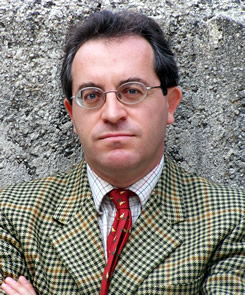
Twenty-five years a freelance journalist means I am fairly disciplined, I think. Beginning early after breakfast, and stopping for a quick lunch, I continue until the children are home from school or an animal needs feeding. I do visit Facebook every few hours, for a couple of minutes each time, which is my equivalent to the coffee machine in an office. Prior to 1990 I used an old Adler and as a highly reluctant convert to computers I’ve used only Apples since switching. I don’t have a target of x-thousand words per day but instead write until I feel myself flagging, or have completed a chapter, and then spend the rest of the afternoon revising - or doing unavoidable admin in which case the revisions are left until the following day. Also I don’t work over weekends, and never have, or on train or ‘plane journeys which I look upon as reading time. The most important thing is that I have quiet, so I’ve not worked to music or Radio 4 since the mid-1980s. How I managed before then I can’t imagine. Also I need to start the morning with a clean desk so my last task each afternoon is always to tidy up. Crazily I’ll file papers away and re-shelve reference books even knowing that I will be hooking them out again the following day. The desk itself is unspectacular, but large, and for about twenty years I have used a rocking-kneeler-stool-contraption-thingie to perch on. It was expensive but it is fantastic and I’ve never had backache from sitting upright for hours on end. When I’m stuck for a word rocking back and forth can help, but the best thing it is so comfortable. I also have a sofa in my study, but I never sit on it if I’m in work mode.
Sean Longden
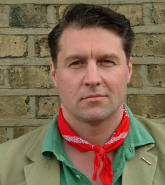
My dream was always to have a dedicated office, one that would be neat and tidy, with the perfect desk and chair, antique wooden bookcases and an old wooden filing cabinet for my documents: A place to both work and relax, where my book shelves would be on hand for reference. For years I dreamed of this room. And now I have it. Except that I’m so busy (or as my wife would put it, so lazy …) that I’ve spent the last year putting off moving the computer downstairs from my scruffy old spare bedroom - with its cheap broken office chair, horrible Ikea desk and piles of old notes and waste paper covering the floor – where I still write. Maybe I’m afraid of the move away from the room that had seen me produce some work I remain proud of? Even if it does mean I still sit on a chair with my feet wrapped in endless cables that seem to go nowhere. Maybe the new office, with ready access to the coffee maker and drinks cabinet has too many distractions? Or maybe the view from the window – out across the garden – is too much of a lure compared to the view of a dirty brick wall from my old office window? Or maybe I simply need to stop making excuses, unplug the computer, shift it downstairs, and set to work in the room of my dreams.
Sian Mackay
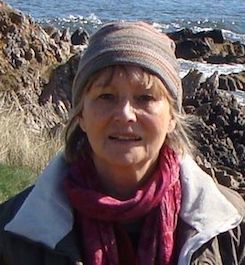
I write in a coastal village in the Scottish Highlands, and, from time to time, in Edinburgh. In the studio up north, a round table near glass doors overlooks a small, secluded garden. Radio and mobile phone are switched off; there is no landline. Birdsong is the only sound I hear. The tools of the trade are to hand on the table - notebook(Blackwell’s A4 unlined, paper-brown cover), my favourite pen, research material – and the prospect of coffee and a rolled cigarette mid-morning encourages me to begin. There was a time when I worked on a book for hours at a stretch, but now, in my more mature years, the sustainable spell is four hours every morning, five days a week. I break the silence around one o’clock with Radio 3’s Lunchtime Concert at full volume. Then I carry thoughts about what the morning has produced, and where the next day’s work might lead, through the woods and dunes of my habitual walk. A nap might follow, or reading. Some afternoons, to save myself from the blues, I seek out a friend, or track down an evening entertainment. The work in progress is never far from my mind. Alas, the pen and paper stage of writing is short-lived - my favourite time, when head, heart and hand are in sync. Soon after I’ve written the first draft of a chapter, story or essay, the Mac is brought to the table, eager to format my words. I think of it as a gemstone-polishing tool, as edit after edit (eight drafts are the norm) and week after week, the rough pebbles of my earlier attempts are alchemised into something finer.
Neil McKenna

I hate writing. I love the research stage of a book. I love the editing stage of a book (if it’s going well). And I love those post-publication feelings of enormous satisfaction and pride. But I hate the process of writing. In order to write I need what I call ‘my long days’, days where I get up, have breakfast and sit in front of the computer, usually in pyjamas and dressing gown, and work for six or seven hours or even more, broken only by coffee breaks and loo breaks, and a hastily made sandwich. I’m in a different mindset on these days, a sort of semi-trance-like state where I enter into the world I’m writing about and where I might end up with a thousand words on a good day, or 100 words or less – and sometimes nothing except a migraine – on a bad day. I prefer to write in silence so I can capture everything in my head and it’s often the smallest things which work the best in writing history and biography. I work in my small womb-like study, which is a total tip. It gets a bit of a tidy once a year and I do hoover it reasonably regularly. But I know where everything is and I think it’s essential to write in the same place. But sometimes if I’ve got an intractable writing problem, I’ll go and sit in a coffee shop or take a ride on a bus and try to resolve the problem with a pencil and notebook. Most of the time it doesn’t work but occasionally it does and I’ve had some spectacular results doing this.
When I first started writing as a journalist, word processors hadn’t been invented and I found writing by hand or on a typewriter very linear. When, trembling with nerves (I am a very nervy person) I finally got to grips with the word processor, I found and still find it liberating and exhilarating. I can think and write on several fronts and polish and tweak and tweak and polish endlessly until I get my writing as perfect as I possibly can. I’m a great believer in editing with a hard copy and a pencil. What works on screen doesn’t always work on the page and I always like to sit down with a cup of tea a day or two later and scribble corrections on a print-out of my writing. I am a perfectionist and I wish I wasn’t but it’s a fundamental part of my writing DNA and I think it’s worth knowing who you are as a writer. I’m slow but impatient, under-confident, far too tough on myself, and take on ridiculously difficult writing challenges. I’m really a mass of conflicting and unresolved issues, but then aren’t all writers? Isn’t that why we write? But that’s probably a question for another time!
Clare Mulley
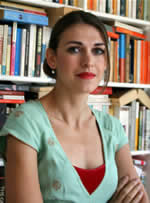
I write at home, where I am lucky enough to have a room of my own, shoved full of books, some read, and piles of things mostly not dealt with. This makes for a lovely environment for frequent distraction. Between 9am-3.30pm I have the luxury of an empty house. In the mornings this luxury seems so delightfully infinite that I dally about, a feeling I regret when it is suddenly midday and I have focused entirely on coffee, twitter, emails, clothes washing, bills, and ‘stuff’. When I finally get going I write on a computer. I like the idea of the words going in somewhere and I think ebooks seem more telepathic, just letting the same words out again. However I prefer to read physical books; liking bodies as well as minds. Similarly, having written good bits I love to ‘cut and paste’, but often end up printing stuff out and using scissors on the floor to rearrange a chapter. I sometimes have piles of paper laid out under various paperweights, which I navigate guiltily to the kettle. As I am easily distracted I face away from the window, which means I jump loudly if my daughters knock on it when they get home from school. I have a great au pair and I often write better when I can hear them all, as it reminds me that the last couple of hours are precious. But in fact, most of my writing gets done in the evenings when the girls are in bed and I get that vital sense of urgency - which is probably why I can’t get going easily again the next morning.
Linda Porter
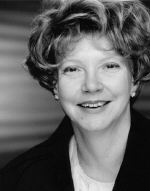
When I’m working on a book I generally write from 0900 to 1300, four days a week, though I’ll work every day if I have to. Fortunately, this is rarely the case. The hours are a leftover from working in the corporate world for 25 years – I’m used to starting early. I cannot concentrate to work for much more than four hours a day and very dry eyes mean that much longer in front of a screen is not a good idea. I take a short break every hour to adjust my posture and rest my eyes. I write in my study, overlooking trees in the back garden and I need as much quiet as possible, so no music. I write quite quickly and with the minimum of alteration. It is a gift and I am grateful for it. Someone I once knew described writing as an ‘affliction’ but I view this as nonsense. I write to an agreed outline with my publisher, which I may stray from somewhat, and I have a plan for each chapter, though, again, these sometimes develop along different lines. One of the best pieces of advice I was given as a History undergraduate was to treat the reader as if they were intelligent but ignorant. Too much emphasis is placed these days on the mechanics of writing. Everyone can polish what they produce but I firmly believe that good writing cannot be taught. If you don’t have the ability in the first place, no amount of expensive and pretentious courses will change that. I see there is even a course in how to write biography these days. No doubt it will be a nice little earner for the university concerned.
Katharine Quarmby
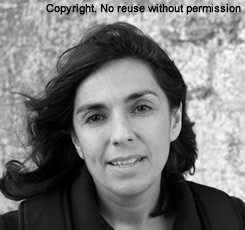
If I’m not out on the road, interviewing people, I spend most of my time in a very small room, writing. I’ve learned that my most productive hours are in the morning, from about 8am till about 12.30/1pm (just in time to knock off and listen to World at One, on Radio 4). Luckily both my children have finally gone to secondary school, leaving this time free, although I occasionally interrupt it for a coffee with friends. But I’ve grown jealous of that writing time, because I know it’s ‘flow’ time for me, and I can concentrate as I never manage to do in the afternoon. I find if I set myself a goal the night before (I love making lists on my phone) of what I need to achieve then I can get a lot done in four to five hours of concentrated work. However, I do get distracted. My very small office, where I work at home, looks out over gardens, and before the number of cats reached a certain level, I spent a lot of time looking at the birds. Now there aren’t so many of them, and the double-glazing on the window has failed, so the window has fogged up. I see through a glass darkly…but it stops me getting so distracted. My chair is great. After I finished my first book (Scapegoat: why we are failing disabled people, 2011), I realised I had to take my back pain seriously. I went down to Old Street, where there are some great chair shops, and invested in a comfortable chair that has made a great difference to how long I can work for. But I do spend a bit of most afternoons exercising, mainly to relieve back pain.
I can’t work with music on. I’ve tried, but it doesn’t work for me. There is constant renovation in the streets around here, however, as it gentrifies, so there’s always lorry noise. That doesn’t bother me. Music does. I start tapping along to the beat. However, I do like another sound. For a while, when one of the cats, Bubbles, was just a kitten, during the writing of my second non-fiction book, she used to sit on my desk in front of the monitor. I found that really distracting. Now she lies at the top of the stairs for some reason. The older cat, Boo, lies on the bed in my office, for much of the day, gently snoring. It’s delightful ambient noise. I spend the afternoons catching up with admin and doing more marketing and tweeting than writing, I’ve realised. I can also spend it productively editing, or fact-checking, but the flow has definitely come to an end – it’s not ‘pure’ writing time. I think I’ve managed to get myself into a routine now. Flow, then a break, a bit of yoga, then back to the grind. Then the reluctant school-children return, and another day is ended.
David Roberts
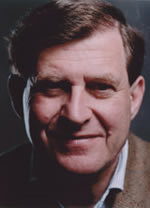
There was a time when I practised self-discipline. It might have been more effective if it had involved whips and chains but it worked after a fashion. It was based on the cruellest emotion - guilt. I saw my wife off to work and then – full of virtue – put down the newspaper and stared glumly at the blank computer screen. Tentatively, I would type a word or two and then another two or three and in a couple of hours I would have a whole page upon which to feast my eyes. But did it make sense? I would re-read it, sigh and press the delete button but at least I had worked and could meet my wife with a reasonably clear conscience when she returned exhausted after a hard day at the office. Then disaster struck. My wife retired. On her first morning as a lady of leisure I came downstairs at eleven to make myself a cup of coffee and she put a question to me which sent a shiver of horror down my spine. She asked what my schedule was. Could I tell her I never had a schedule and could hardly spell the word? No I could not. I dared not disillusion her but what to do? Her simple trust that I was one of the world’s workers and not just a crime writer left me sunk in gloom and cliché. Then I found a solution. Or rather I found a little office away from home. Not far but far enough. Now I went out to work and suddenly I realised how easy it was for the monk in his cell to spend his days and weeks illuminating a manuscript. With no telephone and only Google to talk to and Amazon to tempt me, I discovered I could write fluently. Virginia Woolf was right – to be an author you need a room of your own.
Julie Shaw

Oh this is my soap box subject for sure. I love when people ask me how I find the time and space to write and how I go about it. The truth is, I guess I’m one of the lucky ones – I have a system, and I can write almost anywhere. The nuts and bolts never change, that’s where my system comes into play. The moment of inspiration of course is first on the agenda, and this usually comes in the middle of the night. Luckily, I only require around 4 – 5 hours of sleep. The first couple of hours of bedtime is spent trying to tame the voices in my head, and when they won’t shut up, I listen. Next is the big plan, the most exciting bit as far as I’m concerned, and for me this takes the form of a huge timeline which (wait for it!) is written on the back of a long sheet of wallpaper, stretched across my dining room wall. This gets filled with dates, ideas, post it notes, felt tipped scribbles and a very rough chapter guide. Then I work my characters. Each is assigned a postcard which gets filled with lots of important information such as their likes, dislikes, mannerisms, particular character quirks, and vitally some background which will explain their motives for being as they are. These cards get blue tacked around my now very decorative wallpaper timeline. (My dining room looks like it belongs to some crazy BAU agent by now) From all that I can then write a fairly concise outline and chapter summaries which is next on the agenda, and this takes around a week. Finally, I start to write. I can read a full novel in one day, and can write almost as fast. I aim to write at least one chapter of around 3000 words per day, which means I can usually write a full length book in one month. I know, that’s fast, very fast, and if life were simple, that would be a given. However, life does get in the way of course, so I’ll say two months to be on the safe side, but really, that’s basically it for me. I should add that under pressure is when I get the most done. Oh, I did mention that I could write anywhere didn’t I? The dining table is the usual place of business – TV on in the background (I do love my Jeremy Kyle and my Big Bang Theory) and usually a family member or two dropping in and feeding me with coffee (my most important tool) but I have been known to write a chapter in the bath, or down on the beach – which is handily across the road from my house. In fact one chapter of my latest book was written on napkins on a Jet 2 flight to Benidorm!
Peter Thompson
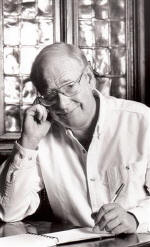
Most of my books are about events in other countries and involve two or three trips abroad. I take a Macbook with me and write in airport terminals, on long-haul flights and in the clubs and hotels I stay in on my travels. All my research goes into the computer and once I have a structure I feed the material into each chapter piecemeal. Back in London between trips I write at a fairly leisurely pace but after the final trip there’s a sustained push to meet the deadline. I usually work in my writing room from midday to midnight, with short breaks for lunch and dinner. I play music most of the time - anything from The Fall and cajun to Swan Lake. I can keep this up seven days a week for three months, producing between 1000 and 1500 words a day and ending up with around 150,000 words which I then revise and trim back as necessary. I live in the West End so there’s a lot of building work within earshot and to escape the noise I sometimes retreat to the study room at my club which is not only peaceful but has a very good library and, if I press a bell, someone brings me afternoon tea. Bliss!
Mei Trow
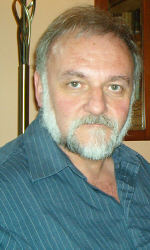
I am a dinosaur. I write long-hand because my typing is so slow. This article has taken me six minutes to write; if I were to type it, we’d be looking at half an hour minimum. As a fiction and non-fiction writer, I have different ‘offices’ for each. Most fiction writing happens in the lounge with various CDs for ambient noise – I am a folk fan, so something dreamy such as Clannad does for the soft/thoughtful/sad/romantic bits and something a little more frenetic such as the Dubliners for the battles/murders/chases. For fact books, I like silence by and large and of course I am surrounded by sources, so for non-fiction I use the summerhouse/office in the garden. This prevents too much domestic screaming when the floor is covered with books. I can write for two hours flat before the wrist and brain give out. A ten-minute break (filled with enforced gardening or some mindless computer jigsawing) and I’m back as if I’ve never been away. Chocolate usually features in some shape or form at this point – orange Kit-Kat are my biscuit of choice, Cadbury’s Dairy Milk otherwise. I have to be in the mood for fiction. Diving into Marlowe’s 16th century or mounting guard on Hadrian’s Wall eleven centuries before that needs an empathy that fact books don’t always require. For that, you need a rapier instinct for information and how to find it, an instinctive grasp of where you’re going and something else I can’t quite … oh, yes; a 20/20 memory!
Katy Weitz
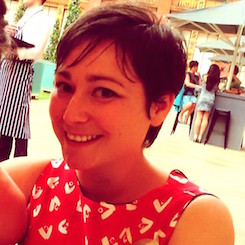
Writing is my job, so I treat it like a job. I work Monday to Thursday from 9.30am till 5pm or as long as school/nursery hours allow. Fridays are flexible since my youngest doesn’t have nursery that day and my partner and I bargain for work time. The only difference with my job is that I choose where my office will be day by day. I have several ‘haunts’ I like to write in – my local library is a favourite, as is the hotel up the road, then there are various coffee bars, rooms in my home and even a beach hut! I like the stimulation of different environments. A book will be written in all of these places over the course of 5-10 weeks. Noise doesn’t bother me at all but I don’t seek it out. Once I am into my work, I am in that world completely and not easily distracted. At the start of each writing day I review the chapters I wrote the day before – it’s a good way to revise my work as I go along and also helps me to ‘get into character’. I can usually do two chapters a day which averages at about 7000 words but I aim for five chapters a week just to keep the pressure off and to build in revision time at the end. It all goes straight onto the computer and then saved into my DropBox – I’m paranoid about losing work! Some days it comes out easier than others but I always try to hit my targets because writing to deadline means you can’t be too precious. If the muse isn’t there I just plough on regardless and hope it returns the next day. Perhaps at the beach hut.
David Weston
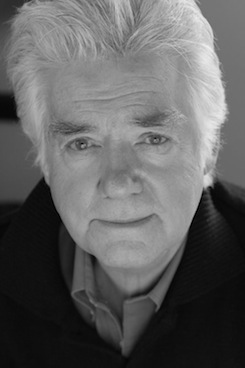
I live in an old railway station on the river in Pimlico and am writing this in a high-ceilinged room, sitting in a very comfortable high-backed swivel chair, with my back to a large window with light streaming in through a venetian blind. I would be distracted if I had a view. My cocker spaniel is sleeping in his chair next to me, thinking he’s helping me, as he always does. My laptop is on an old dining room table with plenty of room for the books I am consulting to be spread about me.
I came to writing late in life and find it a more satisfying activity than golf or gardening. I write historical novels and nonfiction and all my work is based on facts. I love switching on the computer each morning and hearing that welcoming sound, knowing that I have a helper on hand to assist me throughout the day. Even so, I put off starting work as long as possible: I check my emails and then catch up on the latest news on the website of Chelsea FC, and the Guardian’s excellent culture section. I have my second cup of coffee before I finally begin.
I do most of my work before lunch. I do not know how they managed before cut and paste. I constantly revise and edit. The speed varies from book to book – if there is a lot of research required I am happy if I manage a page and a half a day. Reminiscences flow very much quicker. I usually go over what I have written in my mind in bed at night and hope for inspiration for the following day. It is a wonderful feeling to wake up and know what is going to happen next
Chris Woodford
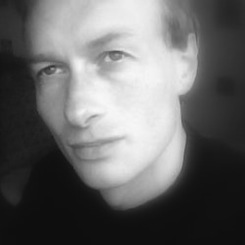
In darkness or light, with the sunrise over the sea or a lighthouse winking at night, chattering on an old typewriter or swiping an iPhone, even laying royal blue snail trails with a fountain pen. None of these things matter. The one thing I absolutely need for writing – the single thing I can’t do without – is silence. Strange, this, because when I worked as an in-house editor about 20 years ago, my open-plan office overlooked Charing Cross Police Station in central London and silence was so far from possible that noise never bothered me. Now, living and working on the Dorset coast, relative quietness pushes silence, paradoxically, even further from my grasp. I could happily cope with sirens on The Strand. But now the ambient noise comes mostly from sheep, I can’t tolerate a strimmer whining through weeds at 100 paces. At best, my quest for quiet is a potted version of the spiritual journey Sara Maitland sketched out in her wonderful A Book of Silence (Granta, 2008): “Silence does not seem to be a loss or lack of language; it does not even seem to be the opposite of language. I have found it to be a whole world in and of itself”. In this world, writing takes flight. But I worry that stalking silence so obsessively could end like the DH Lawrence short story The Man Who Loved Islands, where a rich man’s pursuit of paradise rapidly spirals into a nightmare: “He wanted only to hear the whispering sound of the sea, and the sharp cries of the gulls, cries that came out of another world to him. And best of all, the great silence”. But what if no silence is ever great or silent enough? Fortunately, Boots earplugs (soft foam or aeroplane flange, both under a fiver) muffle the kerfuffle 9 times out of 10. And for those occasions when blocked ears can’t keep the world at bay, I have an endless loop of “pink noise” (low-frequency random noise, like the sea or the wind) on my MP3 player that I can blast through noise-cancelling headphones to blot out reversing alarms, pneumatic drills, or anything else that blocks my way to my words. I write by myself, in my head. Quiet please! Thank you.
